For the benefit of 2016 vegans – here – are HappyCow’s Maine listings
In our Ernest Bell Library, we have an original handwritten letter from 1834, identifying one early ‘close to vegan’ Portland resident – Reverend Henry Aiken Worcester, a Swedenborgian minister – and one ‘vegan’ visitor – Dr. Sylvester Graham.
The letter tells us that Portland was quite a ‘vegan paradise’ in the 1830s.
I use ‘vegan’ with inverted commas because in 1834 we are 110 years away from the founding of The Vegan Society.
Words and phrases which we are unsure of, or which are illegible, are in red. The grammar and punctuation have been worked on just a little.
The Worcester family is excellently documented. We can confidently identify everyone mentioned in the letter – details below.
Over to Henry –
~ …… But I tell you that the physicians, all but one quack, of Portland, a very scientific class of men, have attended the course, and I believe all, to a man, acknowledge the correctness of Graham’s principles.
The change that it is making in this city you can hardly conceive of – for a very large portion of the inhabitants have adopted his mode of diet and manner of living. ~
The inhabitants of Maine have quite a history of ‘sensible’ decisions. In 1851, Maine led the nation by passing the first state law prohibiting the sale of alcohol except for “medicinal, mechanical or manufacturing purposes.” The law subsequently became known as the Maine law, as 18 states quickly followed. –
In the letter, Henry Aiken Worcester is explaining to two of his unhealthy sisters, a brother-in-law, a niece & other family members, about his own decision to adopt ‘veganism’.
~ I have been attending a course of Lectures on – Diet – Health – Longevity etc. given by Dr. Graham of New York, who has rendered himself somewhat remarkable for the course he has pursued. By profession, let me tell you, he is a Presbyterian minister, so I have no religious prejudices in favor of his religious observation, and you may perhaps give me more credit for what I shall say.
But I confess myself a convert to his mode of life in theory and now in practice. ~
Henry gives them comprehensive guidance.
~ Now for the regimen.
1st – Drink – cold water – Nothing else – understand – tea and coffee from all sources etc. are swept off the board. Pure cold water forever!! Try it three weeks with your food and you will want nothing else – you don’t believe it but you will find it true.
2nd – Food – No meat!! Not of any sort! Nor fish – nor fat – nor cheese – nothing of the kind.
But first good wheaten bread, made of the wheat ground, but not bolted, in a corn mill, not sifted. You will not understand the reason, but it is so much more wholesome than flour as this, live upon it alone with water and you will enjoy perfect health, but live on flour bread alone and in about three month you will die!! Make it good – keep it sweet – but never eat it warm.
Second – Vegetables of all sorts – you may eat with it – give – beans – peas – (without meat) – potatoes – all garden vegetables – corn – etc. cooked as you like best, without meat or butter.
Third – put upon your table also fruit in all the varieties of the season, that is one sort at a time – Strawberries – Raspberries – Currants – Gooseberries – etc. – Plums – Apples – Pears – Peaches – etc. These are to be eaten remember with your meal, if at all. For you are never to disturb the stomach with anything between meals. Nothing at all.
Except for children – avoid milk – use little if any butter or cheese – better none.
Take your food regular – and never eat within three of four hours of bedtime.
And last, avoid eating too much – mind that!!
And sleep upon a straw bed or mattress of hair or herbs – (I have for several summers not slept upon feathers, and never wish to again). ~
board = table
wheaten bread = coarse 100% wholemeal bread
flour bread = white bread
bolted = sifted / sieved = the bran removed
He asks them not to embrace ‘veganism’ half-heartedly & he also remembers to warn them against using tobacco.
~ …… don’t go to tampering and qualifying what I have said – and try one part and leave out the rest, and then give it up as good for nothing!! But go for the whole. And you will be well.
Have I left out tobacco? If so that is beside of room!! in all forms chewing – smoking – snuff – it is no better. ~
beside of room = due to lack of area to write about it
Regrettably Henry only lived another 8 years, his second child was born posthumously.
…….
More on Sylvester Graham & his ‘Grahamite’ followers: –
-
Proselytizing in New York & Boston – also in the 1830s – here.
-
Founding the first ‘American Vegetarian Society’ in 1850 – here.
-
Influencing folk in London, UK in the 1850s – here.
-
Influencing Russell Thacher Trall & others in the 1850s – here.
-
Graham’s follower Mary Gove Nichols, & her husband Thomas Low Nichols, helping our Ernest Bell to become a plant eater – here.
-
Henry S. Salt appreciating Graham – here……..
The personalities mentioned in the 1834 letter
Dr. Sylvester Graham in Portland, Maine – more – here.
~ While they gained adherents, Graham and his followers also attracted a good deal of ridicule and sometimes violent opposition. Since Graham’s system included a pointed an attack on the commercialization of food, it is not surprising that commercial food producers were among his most vociferous opponents. On more than one occasion, Boston butchers and bakers stormed Graham’s lectures. An irate mob in Portland, Maine, also prevented Graham from speaking about sexuality to mixed audiences. In response, Graham’s disciple Mary Gove Nichols began delivering lectures on diet reform to female audiences in Graham’s place. ~
This remarkable website – http://www.worcesterfamily.com/ – is our main source of information – the VII-…. numbers refer to the coding on that site.
7 family members
1) brother Henry A. Worcester – our letter writer.
VII-98 Henry Aiken Worcester
Birth: Sep. 25, 1802 Hollis, Hillsborough County, New Hampshire, USA
Death: May 24, 1841 Portland, Cumberland County, Maine, USA
~ Rev Henry Aiken Worcester ~ age 38
An obituary notice says of him: “Mr. Worcester’s amiable, frank and social qualities gained him many warm friends, and his character and acquirements were such as to ensure to him universal esteem.”
Religion: Swedenborgian, New Jerusalem Church, Boston, Suffolk, Massachusetts, USA: Membership: 7 Oct 1832, Boston, Suffolk, Massachusetts, USA
He graduated at Yale College in 1828; studied theology at New Haven, Conn; New Jerusalem Minister (1840): preached some time in Abington, Plymouth, Massachusetts, USA, Bath, Sagadahoc, Maine, USA, Gardiner, Kennebec, Maine, USA & Portland, Cumberland, Maine, USA, to Swedenborgian churches.
Authored, “Sermons on doctrinal subjects” (1837), “The Sabbath” (1840)
Married (26 August 1838, Gardiner, Kennebec, Maine, USA): Olive Gay (Birth: 30 Dec 1804, Gardiner, Kennebec, Maine, USA – Death: 29 Apr 1881, Gardiner, Kennebec, Maine, USA) d/o Rufus Gay & Mary Marble
Died: 24 May 1841, Portland, Cumberland, Maine, USA
http://www.findagrave.com/cgi-bin/fg.cgi?page=gr&GRid=74494498 – Henry Aiken Worcester’s grave.
2) sister Sarah is Henry’s elder sister & is married to 3) Daniel French, the addressee
VII-89 Sarah Alice b Bedford, N.H., Mar 12, 1786, d Oct. 31, 1875; m Daniel French. Residence Hardwick, Vt. No children.
http://boards.ancestry.com/surnames.french/2233/mb.ashx
Daniel French, who was born about 1784 in Charlestown, NH, joined the 11th U.S. Regiment at Hardwick, VT in 1812, lost his left leg at the seige of Ft. Erie in 1814, received a pension from the government……
4) sister Hannah is Henry’s elder sister.
Hannah married to Francis Fuller, after he was widowed by the death of another Worcester sister, Martha. Hannah raised her late sister’s two children.
VII-92 Hannah, b Bedford, N.H., June 22, 1792, d June 6, 1853; m Oct. 11, 1825, Francis Fuller. Residence Hardwick, Vt. No children.
VII-95 Martha, b Hollis, Oct. 24, 1797,d Sept. 9, 1824; m Feb., 1819, Francis Fuller. Residence Hardwick, Vt.
Children of Martha Fuller
(a) Samuel Worcester Fuller, b Apr. 25, 1822, d Chicago, Oct. 23, 1873.
(b) Martha Fuller, b Mar. 22, 1824, 1843. = 5) sister Fuller
6) brother Samuel in Norwalk – a younger brother of Henry……
VII-99 SAMUEL THOMAS WORCESTER b Hollis, N.H., Aug. 30, 1804, d Nashua, NH, Dec. 6, 1882; m May 13, 1835, Mary F.C., dau Samuel Wales, Stoughton, Mass., b Apr. 2, 1802, d Apr. 22, 1874. Mrs. Worcester contributed much to the social and literary life of Norwalk and Nashua. He graduated at Harvard, 1830; studied law Hollis, N.H., Cambridge, Mass., and Norwalk, Oh. admitted to the bar Aug. 1835; practiced his profession in Norwalk, Oh. He was two years (1849-50) senator in the Ohio legislature. While holding the office of district judge for the 10th Ohio judicial district (northwest Ohio), he was elected a member of the U.S. Congress in 1861. In 1867, he removed to Nashua, N.H., where he resided until his decease. He published several spelling books and revised editions of Worcester’s Dictionaries. His monumental work was History of Hollis, N.H., published in 1879. He also published: 1831, Sequel to the Spelling Book; 1833, American Primary Spelling Book; 1872, Old and New, or the School Systems of Ohio and New Hampshire Compared.
7) David another younger brother of Henry……
VII-101 DAVID WORCESTER b Hollis, N.H., Apr. 13, 1808, d May 9, 1893; m June 6, 1832, Ellen, dau of Joseph Sewall, Esq., of Farmington, Me., b Mar. 5, 1813, d at Grand Junction, Col., Sept. 5, 1895. He entered Harvard College in 1828; left in the junior year. He spent a large part of his life in teaching. He was Preceptor of the Academy in Farmington, Me., until Mar., 1833; then the Preceptor of the Academy in China, Me., until Dec., 1834; soon after, Principal of the High School in Bangor, Me., which office he held for twenty years, when in 1859 he engaged in private instruction in that city. In the sixties he returned to his native town and lived a few years there. From Hollis he went to Minerva township in 1869 and lived on a farm for seven years. He then removed to Albion, Ia., where he died at the home of his daughter, Mrs. A. A. Garver. He was an accomplished scholar, and used to spend some time each day in the latter part of his life in reading his favorite Latin and Greek authors. “His character was exceptionally noble and pure and he had the respect of all who knew him.”
…….
The Letter in full – with some minimal tidying up of the punctuation / sentence structure
Capt. Daniel French (3)
Hardwick
V.T.
Postmark is a red Portland, Maine octagon with a bold 18 3/4 cents manuscript rate mark.
Portland June 30, 1834
Dear Brother (3) and Sister (2),
I shall address this letter to you, although I acknowledge myself a debtor to sister Hannah (4) only in the letter line. I have intended etc. to answer her letter before this, but, other things have taken my thoughts and time, but this you may make family property, so she will hear from me. It is more especially intended for yourself sister Sarah, and Hannah – because invalids – though I believe all of my friends may be benefited by its contents.
I will first say what I have to say on the subject on which I write, and then for other things, if I have room.
I have been attending a course of Lectures on – Diet – Health – Longevity etc. given by Dr. Graham of New York, who has rendered himself somewhat remarkable for the course he has pursued. By profession, let me tell you, he is a Presbyterian minister, so I have no religious prejudices in favor of his religious observation, and you may perhaps give me more credit for what I shall say.
But I confess myself a convert to his mode of life in theory and now in practice. And knowing what your habits of life have been, and the sickness, and feebleness to which you have been subject. I believe I am fully persuaded, that they are all to be found to your diet and mode of life. That, if your constitutions are not farther gone, then I hope you can, all of you, be restored to perfect health – and vigor of body and mind.
I mean all that I say, and I have felt as though I could not discharge my duty to you, until I laid the subject before you as well as I could, and exhorted you to give it a fair trial.
 Hundreds, if not hundreds very many of cases of nervous irritability, perhaps as bad as sister Fuller’s (5), have been cured – and sick headache as bad as sister Sarah’s, and constitutions feeble as you all possess have been restored to soundness and health. Now, say, will you give the subject a fair hearing – and try the experiment? Of course I can have no motive except to benefit you. And I wish for your good you would attend, all of you, to what I say. I cannot enter into a subject in a letter so as to show you the effect of different kind of food and drink upon the system. But I tell you that the physicians, all but one quack, of Portland, a very scientific class of men, have attended the course, and I believe all to a man acknowledge the correctness of Graham’s principles.
Hundreds, if not hundreds very many of cases of nervous irritability, perhaps as bad as sister Fuller’s (5), have been cured – and sick headache as bad as sister Sarah’s, and constitutions feeble as you all possess have been restored to soundness and health. Now, say, will you give the subject a fair hearing – and try the experiment? Of course I can have no motive except to benefit you. And I wish for your good you would attend, all of you, to what I say. I cannot enter into a subject in a letter so as to show you the effect of different kind of food and drink upon the system. But I tell you that the physicians, all but one quack, of Portland, a very scientific class of men, have attended the course, and I believe all to a man acknowledge the correctness of Graham’s principles.
The change that it is making in this city you can hardly conceive of, for a very large portion of the inhabitants have adopted his mode of diet and manner of living.
Now for the regimen.
1st – Drink – cold water – Nothing else – understand – tea and coffee from all sources etc. are swept off the board. Pure cold water forever!! Try it three weeks with your food and you will want nothing else – you don’t believe it but you will find it true.
2nd – Food – No meat!! Not of any sort! Nor fish – nor fat – nor cheese – nothing of the kind.
But first good wheaten bread, made of the wheat ground, but not bolted, in a corn mill, not sifted. You will not understand the reason, but it is so much more wholesome than flour as this, live upon it alone with water and you will enjoy perfect health, but live on flour bread alone and in about three month you will die!! Make it good – keep it sweet – but never eat it warm.
Second – Vegetables of all sorts – you may eat with it – give – beans – peas – (without meat) – potatoes – all garden vegetables – corn – etc. cooked as you like best, without meat or butter.
Third – put upon your table also fruit in all the varieties of the season, that is one sort at a time – Strawberries – Raspberries – Currants – Gooseberries – etc. – Plums – Apples – Pears – Peaches – etc. These are to be eaten remember with your meal, if at all. For you are never to disturb the stomach with anything between meals. Nothing at all.
Except for children – avoid milk – use little if any butter or cheese – better none.
Take your food regular – and never eat within three of four hours of bedtime.
And last, avoid eating too much – mind that!!
And sleep upon a straw bed or mattress of hair or herbs – (I have for several summers not slept upon feathers, and never wish to again).
Now as you value your health – your happiness – a peaceful mind – cheerfulness – contentment – (and it is so intimately connected to all). I deem it not too serious to add your immortal welfare. I exhort you to try this mode of life – make a fair trial, and I believe, in three or four months time, you will believe, and will not need my exhortation to continue. Now, if you try it don’t go tampering and qualifying what I have said – and try one part and leave out the rest, and then give it up as good for nothing!! But go for the whole! And you will be well.
Have I left out tobacco? If so that is beside of room!! in all forms chewing – smoking – snuff – it is no better.
I have set you a hardship on – but try it – try it well – and in three weeks time, you will say your food never tasted so good before. And if pleasure in eating (a low sort of pleasure of rational mind) was the motive, this were a sufficient one for to change your habits of life.
But health of body – of mind – cheerful and happy spirits – these are the great motives to urge you to adopt this course. Economy may be added, but this you will be likely to appreciate. The expense of a family – as far as food and the labor of it is concerned, will not be more than a third of what it is in the ordinary mode of life, to which I have been accustomed. You will not believe till you try it, the effects you will experience. I have adopted it myself, and, as far as my testimony is of weight, it goes to confirm all I have said – – – I have left a little corner for other things.
I came here the first of May. Shall be here about two weeks longer – shall then go to Bath or Gardiner. I spent this year from May in this State. Shall perhaps settle here permanently. Should be glad to see you whenever convenient – intend to visit you as soon as I can, but not this year I think. Had a letter from br Samuel (6) yesterday – he is well – at Norwalk, Ohio. – From David (7) recently he is pretty well. I shall send the New Jerusalem Magazine to some of you next fall.
Your br Henry A. Worcester (1)
Vertical Text 1 – This letter is common property. Of course it will be an expression of love to you all.
Vertical Text 2 – Write me soon – I am much engaged and interested in my profession.
…….
Bath & Gardiner are in Maine.
New Jerusalem Magazine – was the journal of the Massachusetts Swedenborgian community.
…….
One of Henry A. Worcester’s books – in our Ernest Bell Library
…….
An anti-tobacco fob from circa 1840 – in our Ernest Bell Library
Anti-Tobacco Temperance Token from circa the 1840’s. The Token is struck in Brass and features a young man, trampling tobacco leaves, on the obverse –
~ I will never use tobacco, in any form. ~
and an Anti-Tobacco Rant on the reverse.
~ Tobacco, tends to idleness, poverty, strong drink, vice, ill health, insanity & death. ~
During the Jacksonian era (1830-1860) the great awakening a crusade against “Demon rum” and other spirits ensued in states east of the Mississippi River and north of the Mason–Dixon line.
During this era a focus on exercise, non-use of tobacco, and the elimination of coffee, tea, sugar, meat and spice from a diet, called “Grahamism,” – named after reformer Sylvester Graham – was promoted.

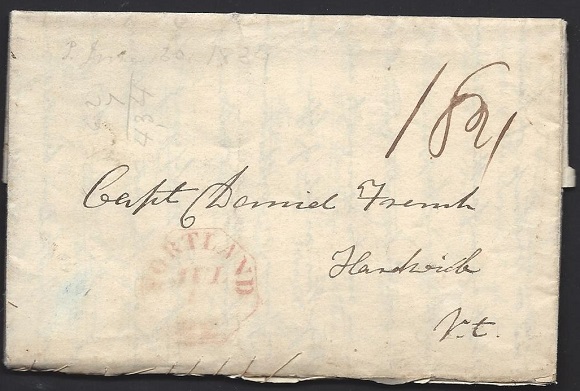
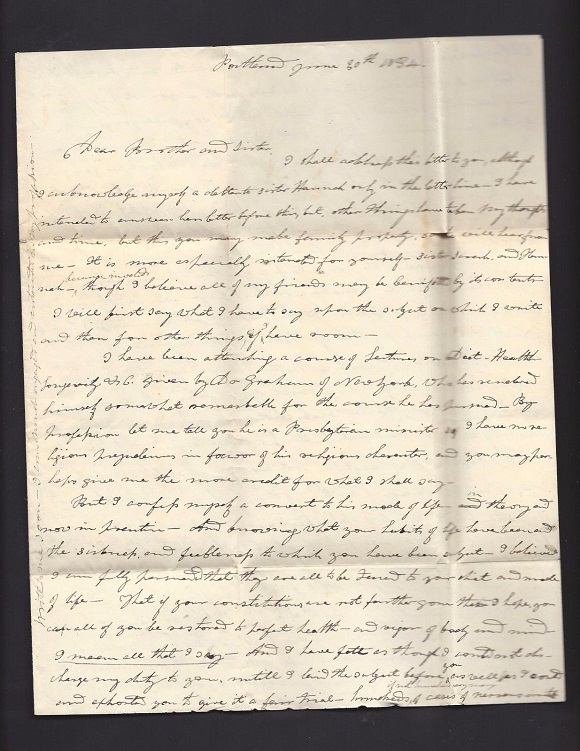
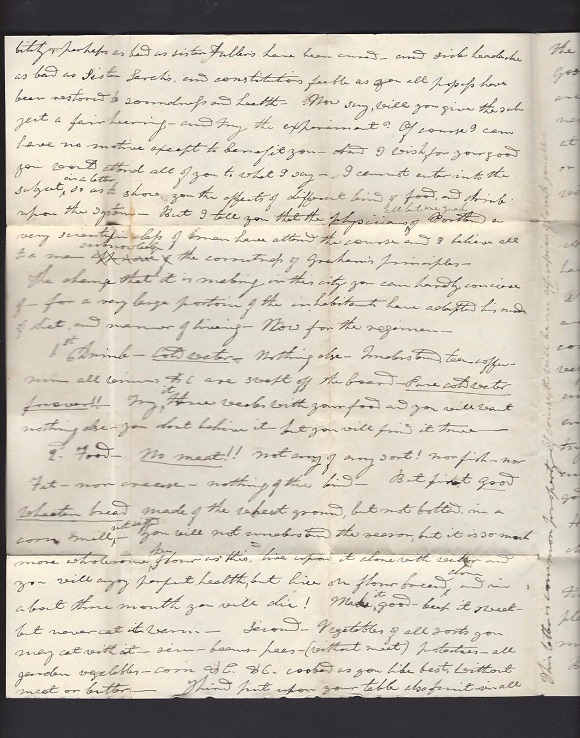
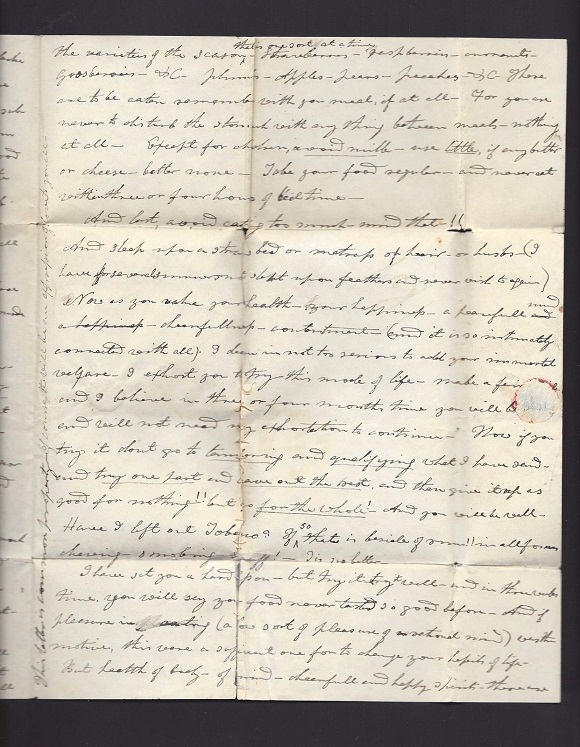
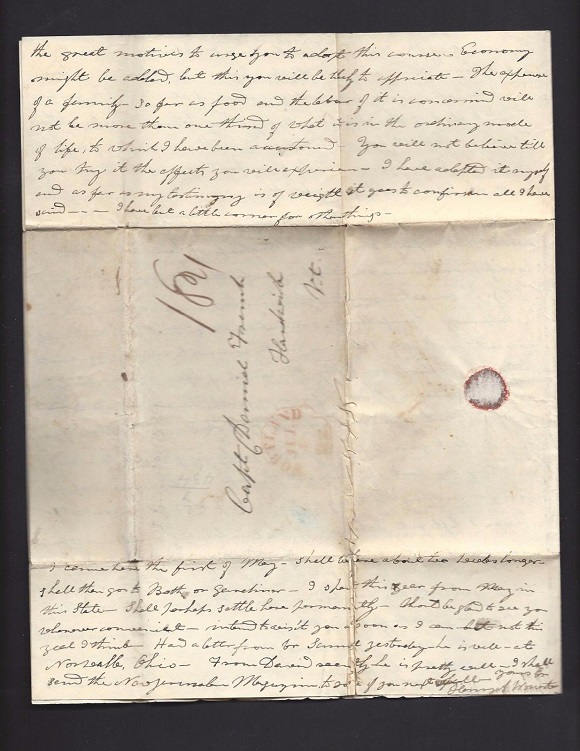
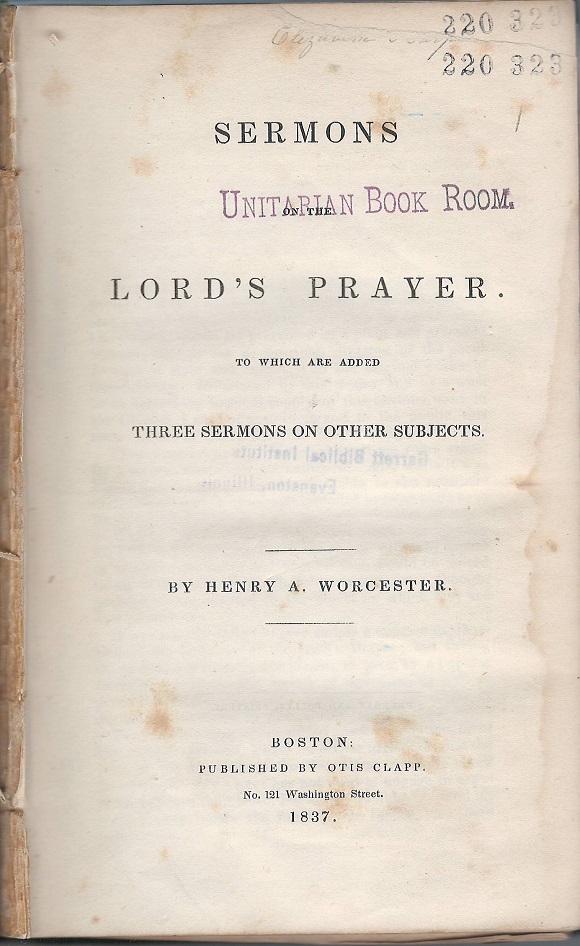
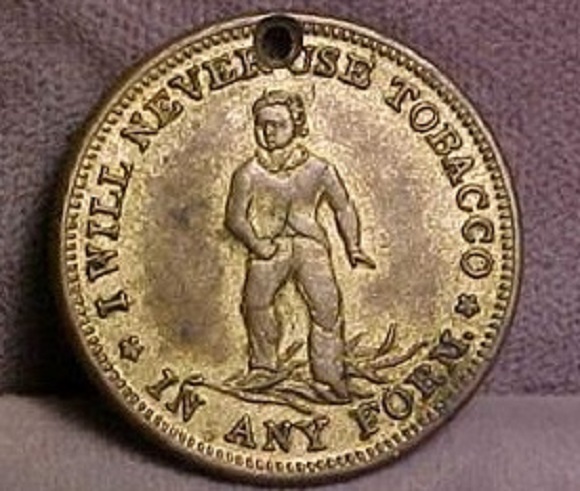
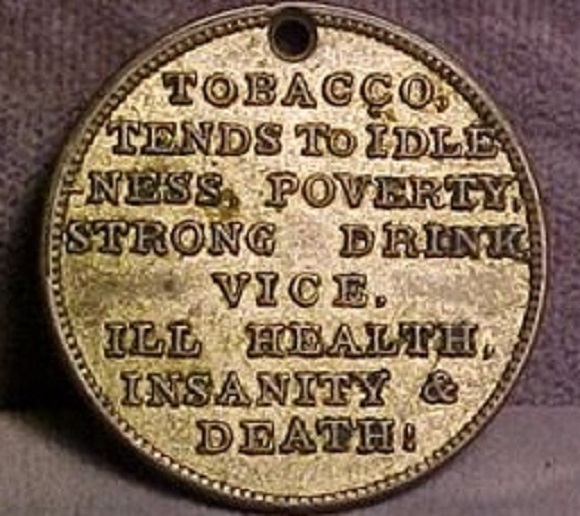
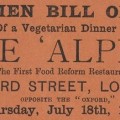
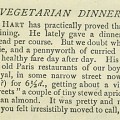
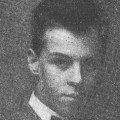
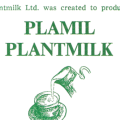
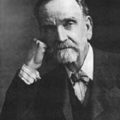
No Comments